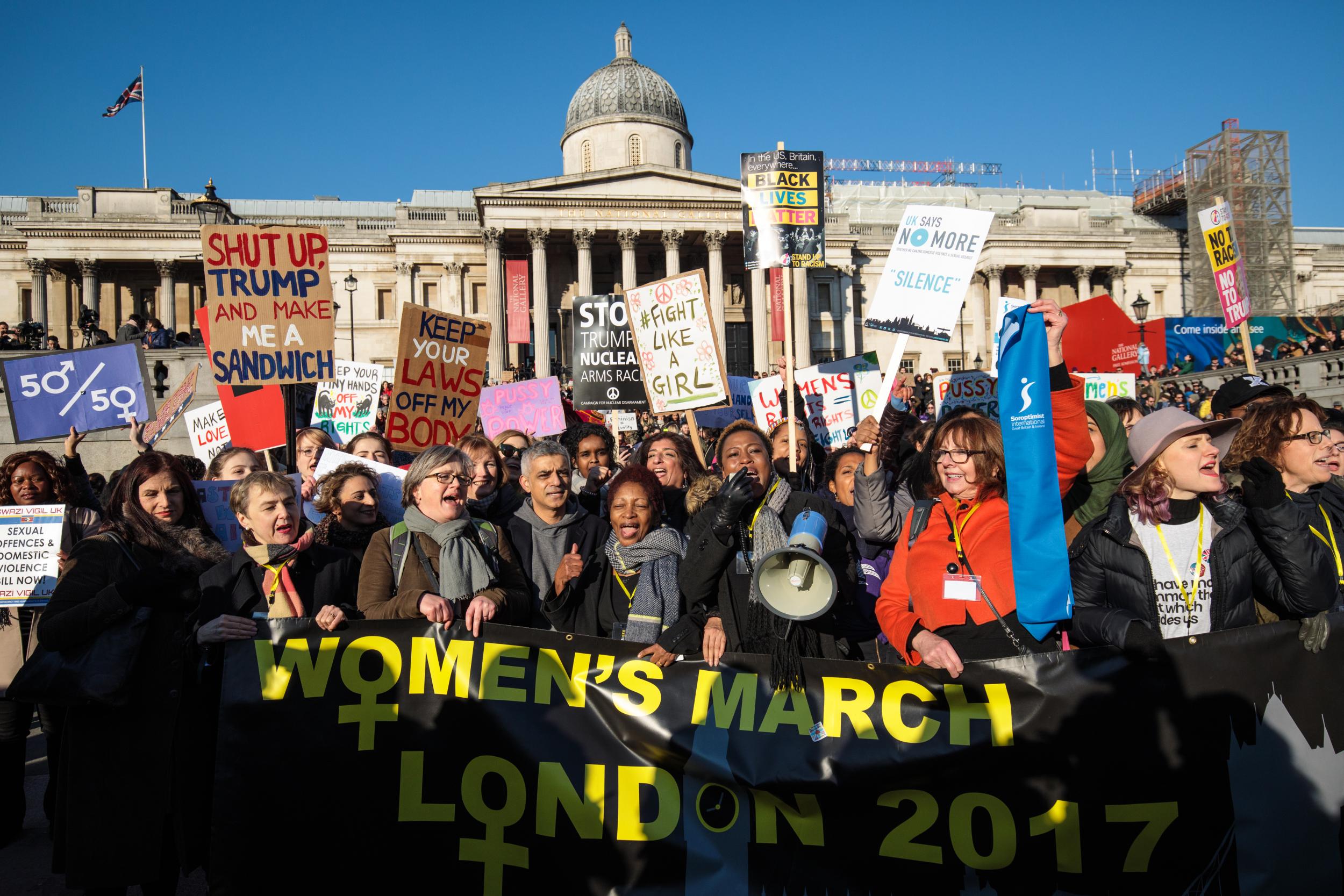What will a Biden or Trump presidency mean for women?
Trump, who previously boasted about grabbing women ‘by the p***y’ in a leaked tape, has gone on to make demeaning comments about women’s appearances since arriving in the White House, writes Maya Oppenheim


The message, at a campaign rally in Lansing, Michigan, neatly illustrated the president's lifelong attitude towards women. In an appeal to female voters, he urged them to re-elect him because “we're getting your husbands back to work”.
Donald Trump’s ill-judged comment was just the latest in a series of misogynistic remarks about women, and highlighted his failure to acknowledge the disproportionate impact the pandemic has had on them.
Across America, working women have been forced to juggle the homeschooling of children with their jobs and have borne the brunt of job losses due to them being more likely to work in sectors which have been hardest hit by the public health crisis, such as hospitality and retail.
To put this into context, four times more women lost their jobs in the US between August and September, according to a study by the National Women’s Law Centre.
But Trump’s attitude is no longer a surprise. A highly-publicised clip of a lewd conversation between Trump and TV host Billy Bush in a bus on their way to film an episode of Access Hollywood, released days before the 2016 election, was tipped to be the silver bullet for Hillary Clinton. It wasn't, and the episode appeared to embolden the president.
Trump, who boasted that he was such a “star” he can grab women “by the p***y” in the aforementioned leaked tape, has gone on to make demeaning comments about women’s appearances since arriving in the White House.
His career has also been rocked by a slew of sexual misconduct allegations which he has denied.
A book, titled All the President’s Women: Donald Trump and the Making of a Predator, details 26 alleged incidents of “unwanted sexual contact” and 43 alleged instances of inappropriate behaviour - adding to a list of nearly two dozen women who had previously accused Trump of sexual assault or misconduct.
But the question remains - where does his Democrat presidential rival, Joe Biden, stand on women’s issues? Whoever wins the election will not just shape the world for years to come, but will also have an immediate and profound impact on the day-to-day lived reality of women in the US.
While Biden has pledged to ratify the Equal Rights Amendment (ERA), which would change the US Constitution to finally include women, the Trump administration has expressly stated its opposition to it. Passing the ERA would enshrine government-related discrimination against women as unconstitutional.
Another clear distinction between Biden and Trump is their choice of running mates. If Biden wins the election, Kamala Harris would become America's first female vice president, as well as the first black woman to be vice president.
Harris pledged to prioritise women’s issues during a speech at the 2017 Women’s March and declared a plan to close the nationwide rape kit backlog during her presidential campaign.
The attorney, who grew up in Berkeley, California, has been a long-time advocate for women’s right to have an abortion - one of the most divisive and polarising issues in America and a key policy on which Trump and Biden massively differ.
This is particularly significant at a time when there is a very real possibility of Roe v Wade – the landmark Supreme Court decision that legalised abortion nationwide in America in 1973 - being overturned.
Biden, who is currently leading in the national polls, has emphasised that he will safeguard a woman's right to have an abortion. Trump, on the other hand, has backed a total ban on abortions, except in cases of rape, incest or when there is a risk to the mother’s life. The president provoked fury on the campaign trail by calling for “some form of punishment” for women who have an abortion, should it be outlawed.
Polling by the Pew Research Center has found that the general public’s support for abortion rights is the highest it has been in decades. However the Trump presidency has emboldened anti-abortion activists in the US with pro-choice campaigners accusing the president of waging a war on women’s sexual and reproductive freedom.
Julia C. Long, senior research associate at the Campaign for Accountability, a public interest watchdog, told The Independent that Trump has damaged reproductive healthcare.
She said: “As president, Trump has been detrimental to federal protections of reproductive health care by altering the Title X program, granting a network of crisis pregnancy centres Title X funding, and by appointing anti-abortion judges throughout the federal courts.”
The Republican incumbent sparked consternation among women’s rights campaigners when he nominated Amy Coney Barrett to fill the Supreme Court seat left empty by liberal Justice Ruth Bader Ginsburg, who died at the age of 87, in September.
Critics have warned that Justice Barrett, a strict Catholic who is an outspoken opponent of abortion rights and LGBT+ rights, is an “extreme ideologue” who would overhaul decades of progress on women’s rights.
She was confirmed to the Supreme Court by the Senate this week in a massive blow to Democrats. Her confirmation is the closest to a presidential election in US history - with Chuck Schumer, the Senate’s top Democrat, arguing it was one of the “darkest days in the 231-year history” of the Senate.
Jamie Manson, a longtime women’s rights activist who is president of Catholics for Choice, told The Independent: “For women and other marginalised groups a Biden presidency would be worlds away from what Trump’s has been, particularly when it comes to access to abortion care and reproductive health services.
“For starters - with Biden in office we can expect to be rid of the ‘global gag rule’, which prevents foreign organisations from getting aid from the US for even simply providing information about abortion services. The Trump administration has been calamitous for abortion access, at home and abroad. Joe Biden is one of the 68 per cent of US Catholics who don’t want to see Roe v Wade overturned and has long been a vocal supporter of a woman’s right to choose.”
It is important to note there is a long-standing gender gap in voting preferences in the US which surfaced back in 1980 when it became clear women were far more inclined to vote Democrat, while their male counterparts were more likely to vote Republican. Women also tend to turn out to vote in higher numbers than men in America.
Johanna Cervone, of the Women’s Equality Centre, told The Independent that the last four years has seen the Trump-Pence Administration “disintegrate decades of accomplishments” on women’s access to critical healthcare and abortion both in the US and overseas.
While Anna Chu, of the National Women’s Law Centre Action Fund, said she is fearful Trump would view a second term as a “call to further harm women and girls, immigrants, LGBT+ communities and more - despite the fact that he’ll likely lose the popular vote by an even wider margin than in 2016”.
Trump’s support among women has drastically collapsed in his time in the White House. While working-class women voted for Trump in large numbers in the 2016 election, recent surveys show their support for him is deteriorating due to his antagonistic presidential approach and response to the Covid-19 crisis.
The rejection of Trump can be seen most clearly among suburban and college-educated women.





Join our commenting forum
Join thought-provoking conversations, follow other Independent readers and see their replies
Comments